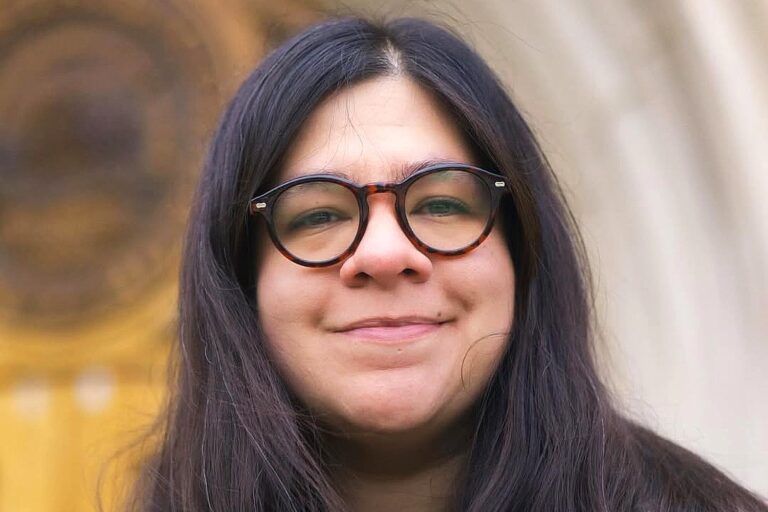
The College of Arts & Letters at Michigan State University has been part of many firsts when it comes to Black history, including hiring David W.D. Dickson, who was the first Black faculty member at MSU and, more recently, establishing the Department of African American and African Studies, which launched the new African American and African Studies major in 2022.
The College continues to build upon this legacy as students, faculty, and staff chart a course for African American and African Studies, academic scholarship, innovative research, and community outreach.
Faculty Impact
In 1948, the Department of English in the College of Arts & Letters broke through barriers by hiring David W.D. Dickson as an Assistant Professor to become the first Black faculty member at MSU. This is where Dickson’s trailblazing career, spanning more than 40 years and five academic institutions, began and where he built a strong foundation for a career that eventually led him to be the first African American to lead a college or university in the state of New Jersey as President of Montclair State University.
At Michigan State University, Dickson taught Bible as Literature, which not only became one of the English Department’s most popular courses, it also confirmed Dickson as a devoted and enthusiastic educator, earning him MSU’s inaugural Distinguished Faculty Award (now called the William J. Beal Outstanding Faculty Award) in 1952.

“I was and have been throughout my life a cosmopolite,” Dickson wrote in his 1995 book, Memoirs of an Isolate. “The blood of three continents flowed in my veins. I wanted to be a citizen of the world, a true internationalist, and to preach the gospel of interracial understanding and love to students.”
However, life in East Lansing at the height of Jim Crow segregation was not without its limitations. Dickson lived in an apartment on campus since no housing was available for him in East Lansing, and when he and his wife, Vera, attempted to buy a house, they were met with opposition, redlining, and restrictive racial covenants. It wasn’t until MSU President John Hannah intervened that the Dicksons were able to purchase a home near campus.
“I was and have been throughout my life a cosmopolite. The blood of three continents flowed in my veins. I wanted to be a citizen of the world, a true internationalist, and to preach the gospel of interracial understanding and love to students.”
David W.D. Dickson, from his 1995 book, Memoirs of an Isolate
In 1955, seven years after Dickson joined MSU’s faculty, the University hired a second Black professor, and in 1957, William Harrison Pipes became the first Black faculty member at MSU to be granted full professorship.
Dickson spent 15 years at MSU before taking academic and administrative appointments at Northern Michigan University, Federal City College, SUNY Stony Brook, and finally, Montclair State University where he was inaugurated as that institution’s fifth president in 1973. Just three years prior, in 1970, Clifton R. Wharton Jr. became the first Black president of a major U.S. university when he was named president of Michigan State University.
READ MORE: The Trailblazing Life of MSU’s First Black Faculty Member
Student Activism
In 1967, almost 20 years after David W.D. Dickson became the first Black faculty member at MSU, Barry D. Amis, a doctoral student in Spanish at the time, helped found MSU’s Black Student Alliance in the midst of national and campus-wide student protests over racism.
Amis served as the first president of the Black Student Alliance, and a year after that organization was established, he led the group in peaceful protests prompted by the assassination of Dr. Martin Luther King Jr. This led to the creation of a list of grievances that the Black Student Alliance presented to President Hannah and the MSU administration asking that they make the history, culture, and participation of African Americans a more integral part of the MSU environment.

“What we did at the time at MSU was groundbreaking,” Amis said.
When Amis first came to MSU in 1966 as a doctoral student, he was struck by the friendliness of the campus, but the lack of diversity among students, faculty, and staff was obvious. He learned about an initiative to bring a small cohort of 25 Black students to MSU and felt the effort was insufficient. He wrote a letter to the editor of The State News lambasting the program as “tokenism.” Among those who read the letter was President Hannah, who invited Amis to come and chat about his concerns.
“What we did at the time at MSU was groundbreaking.”
Barry D. Amis, Ph.D. in Spanish graduate and Co-Founder of MSU’s Black Student Alliance
Motivated by the reaction to his letter, Amis and others set out to form a group for Black students. Associate Professor of Education Robert L. Green served as faculty lead and opened his home for a core group of students to meet and organize the Black Student Alliance, an organization still active to this day. Green himself was a national civil rights leader who became one of the first Black homeowners in East Lansing after legally challenging the city’s practice of redlining.
In 1969, Amis joined the MSU faculty as an Assistant Professor of English and Romance Languages. He simultaneously finished his Ph.D. in Spanish in 1970 while teaching Beginning Spanish and Contemporary African American Literature, a course he developed.
“MSU has always been special to me because of the people I interacted with,” Amis said. “It was just a great time to be there.”
READ MORE: Alumnus Reflects on Legacy as a Student Activist and a Black Student Alliance Founder
Ongoing Black Legacies
Today, MSU continues to explore the legacies, engage the present, and build Black futures through the Department of African American and African Studies (AAAS), offering collective study, conducting innovative research, and empowering new generations of global citizens, scholars, and activists.
From its inception in 2002 as a Ph.D. granting program, African American and African Studies at MSU has recognized the need to continually evolve to reflect the goals and needs of Black communities, faculty, staff, and students. This commitment led the College of Arts & Letters to establish the Department of African American and African Studies in 2019.

The AAAS Department embraces diverse scholarly approaches to research, teaching, and civic engagement required for comprehensive study within the larger Black Studies discipline and is committed to making concrete connections between its scholarship, pedagogy, and social justice.
“We have a tremendous amount of gratitude for our MSU colleagues for being there and welcoming us at every step of the way,” said Ruth Nicole Brown, Inaugural Chair of the Department of African American and African Studies. “They have served on committees and shared their generosity and ideas. It has made a world of difference in terms of us being able to do our best work. We are indebted to the sacrifice and receive well the responsibility to carry forward the dreams of generations, and we are acting with great hope and with great enthusiasm for the generations yet to come.”
“The way we are thinking about our courses and students is not only to meet this moment in time, but to create a foundation for generations ahead.”
Ruth Nicole Brown, Inaugural Chair of the Department of African American and African Studies
The AAAS Department continues to evolve with an expanding curriculum, unapologetic centering of Black Feminisms, Black Genders Studies, and Black Sexualities Studies, and a purpose of “living beyond survival into wellness.”
In 2022, under Brown’s leadership, a new Bachelor of Arts degree in African American and African Studies was introduced. This new undergraduate major is reflective of students who come to MSU to pursue higher education with a real-world, sincere desire for change.

Graduates of the new undergraduate program will be poised for careers across industries, including education, health and medicine, technology, politics, nonprofit advocacy, publishing, and arts and entertainment. These graduates will have the skills to contribute to and create new organizations and ideas to do meaningful cultural and community-based work.
“The way we are thinking about our courses and students is not only to meet this moment in time, but to create a foundation for generations ahead,” Brown said. “Now that MSU students can major in AAAS, we are excited about their involvement in shaping the department and working together to facilitate additional practices of Black joy, wellbeing, and community building on and off campus. Integrating students’ scholarly interest with activism, social justice, and the arts is integral to our approach in AAAS.”
“Our goal has been to make the AAAS Department an irresistible destination for students, staff, and faculty — a place for Black Studies, shaped by Black Studies.”
Christopher P. Long, Dean of the College of Arts & Letters and the Honors College
In November 2022, the MSU community celebrated the opening of the newly renovated 8,400-square-foot space in North Kedzie Hall dedicated to the AAAS Department. This new space combines elements of form and function to maximize scholarship, creativity, and activism among students, faculty, and staff. The grand opening event, called “The Ascension of AAAS,” also commemorated the establishment and forward movement of the AAAS Department.
“Our goal has been to make the AAAS Department an irresistible destination for students, staff, and faculty — a place for Black Studies, shaped by Black Studies,” said Christopher P. Long, Dean of the College of Arts & Letters and the Honors College. “To experience the reality of this vibrant and dynamic new space is a dream come true. May it be a place of wholeness for scholars and students in African American and African Studies for generations to come.”
READ MORE:
- MSU Celebrates New Academic Learning Space for Department of African American and African Studies
- New BA Degree in African American and African Studies Now Offered at MSU
- Inaugural Chair of Department of African American and African Studies Appointed
- New Department of African American and African Studies Approved

